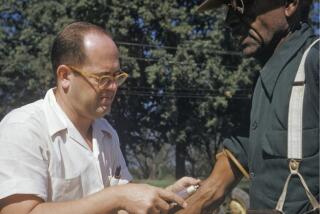THE NATION : CIVIL RIGHTS : Black Americans: Still Believers in the Perfectibility of Whites
- Share via
Conservatives, moderates and liberals alike (black and white) now hurl “pull yourself up by your bootstraps” bromides at the black community. Bill Clinton stands before black Baptist congregations extolling the virtues of “personal responsibility.” These cons, mods and libs often claim (sometimes rightly) that old-style, ‘60s, liberal Great Society programs have not yielded adequate results, and that some of the programs have proved counterproductive. Some, particularly the black ones, insist that a “culture of dependence” has caused African Americans to hitch their stars to the government’s supposedly benevolent wagon.
What these politicians and pundits fail to see is that they’re viewing the situation through the most narrow of lenses. The whole truth is more frightening, because the acknowledgment of it demands enormous changes in the way black Americans view our minority selves in this majority culture. The whole truth is that black Americans are the ultimate American Dreamers. Despite a history that should have taught us better, we still believe in the Constitution. We still believe in the perfectibility of this Republic, of its political and popular culture with respect to us, both of which are most identifiably embodied in the form of the (ever demonized) “White Man.”
Our problem is that we still believe. We believe more in the perfectibility of “them” than we do in the perfectibility of ourselves. We are the last American Dreamers, the last of the true believers.
Perhaps we learned our Christian lessons too well. The civil-rights movement boasted more than its share of reverends. To this day, “reverend” is the most common title for black men (they always are) accorded the mantle of “black leader.” Historically, the reverends were the most educated and worldly men in the pre-civil-rights-era black community. They performed a myriad of tasks. When it came time to demand our rights within the broader culture, we looked to the reverends for leadership. And we got it.
The Rev. Martin Luther King Jr. became the most visible symbol of the movement. His tactical skills were regularly overshadowed by his verbal gifts, which were formed and infused by his sense of Christian mission. King preached to us, to all of America, of her own perfectibility. He made the sins of the majority popular culture--its bigotry, its violence against black citizens--seem so much biblical waywardness, which he, in true Christian fashion, was willing to forgive and forget. He offered America and her people Christian absolution for their sins--literal and political. America prepared to do penance--political, not personal--penance for those sins. The Great Society was that penance. America would make amends.
I often hear expressions of sadness and wonderment that the civil-rights movement failed to achieve the lasting sea-change in race relations that it seemed to portend. Stereotypes still rage, wages still lag, banks continue to redline, white flight still occurs, the suggestion (always erroneous) that most recipients of any government benefit are predominantly black is sufficient to guarantee support for the abolition of that benefit (when much grander giveaways to all white recipients go unnoticed). In some ways, it seems that little has changed.
In many ways, little has. The civil-rights movement asked precious little. A deeply Christian man and the crusade he symbolized were warmly embraced by a large portion of white America for all the wrong reasons: namely, that the movement preached the perfectibility of the majority and of the society over which they hold sway.
Regarded thus, King becomes a grandly tragic figure with a touch of Ellingtonian plaintiveness about him. His deeply moral beliefs were taken to the hearts of many for self-aggrandizing reasons--less that they could truly claim a lack of prejudice or truly sought to attain such a state, and more a desire to celebrate their own perfectibility without the attendant work of changing the foundation of the way they think. Any non-black individual was welcome to believe that no black person was his or her equal (to believe someone your equal means you acknowledge their potential superiority to you in any given endeavor), but they could join the crowd in saying that the inferior should be treated kindly.
The government offered to make amends, and we (black Americans) believed in the constitutional connection between a government and its people, a connection that has been eroding for at least 30 years, and one in which not even the staunchest flag-waver could believe after the bloodletting of the 1994 political season. We believed that the government actions represented the will of its people. We believed in the goodwill of our countrymen based upon the displays of their “representative” government.
We believed so much that we made the naturally illogical progression to looking to the government to sway its people, looking to political change to stimulate cultural change, asking the cart to pull the horse under the best circumstances--in the forms of, for instance, busing and affirmative action.
The outrageous extent to which we believed was both painfully and poignantly apparent in a journalistic cause celebre a couple of years back. A Yale-educated black lawyer made a big splash with a New York Magazine article in which he chronicled his weeklong exploit as a busboy in a posh lily-white country club. The headline asked why this $105,000-a-year Yale lawyer took a $7-an-hour job as a busboy at the snootiest, whitest country club in Connecticut.
The writer became a mini cause celebre by allowing white readers to feign righteous shock that rich white people uttered the word nigger inside an all-white country club. Both the principally white readership and the black writer’s noble reaction to this shocking news--their crudely choreographed dance of indignation--rested upon their mutual assumption of the inherent goodness of white Americans, their inherent fairness toward their black brethren. Only from this assumption could one be shocked that members of a racist club behaved like racists inside it.
This highly educated, intelligent, successful man believed so much in the perfectibility of “them” that he expressed shock that these people weren’t “good” people. He believed so much--in them.
We still believe. Unfortunately, we have made meals of the majority’s contempt for so long, we keep believing in “them,” in “it,” be it a government, an African past from which we were severed hundreds of years ago as completely as a people could be--anything, but our black American selves.
The Afro American desire (no, demand) for equal access to the fruits of American society is one thing. Putting common sense aside and asking why white people don’t just love us is another. It is the securing of effective access routes to America’s fruits, based on realities at hand, on which Afro Americans should concentrate our efforts. Belief is laudable, particularly in martyrs, but it has limited practical applications. We have focused all our extravagant attentions on “The White Man”--getting him or her to change or behave properly--too little on effectively using our own cultural strengths and capital to navigate this particular American racial minefield.
Damn the concept of The White Man--a concept as racist as The Black Man (one can’t utter the former reduction without succumbing to the reductions inherent in the latter). There are quiet revolutions going on all about us. The middle class shrinks, the industrial laborer disappears, the work force becomes mobile, the two-party system weakens, the American Dream fades. It is a time for upheaval. Let’s start with US this time; and then teach the rest of us (the majority) to see us as we really are, not as its cultural prejudice distorts us--rather than believing so hard that we beg, prod and plead for “them” to change when they have no impetus to do so, save their inherent goodness; and crying and screaming when they do not.
More to Read
Sign up for Essential California
The most important California stories and recommendations in your inbox every morning.
You may occasionally receive promotional content from the Los Angeles Times.













